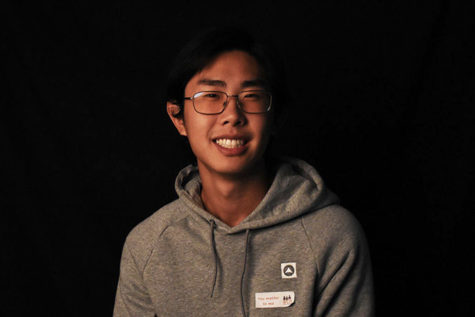Everyone loves Chinese food right? Orange chicken, Mongolian beef and sesame chicken are all great. These delicious foods demonstrate the pinnacle of culture mixing—yet not everything Asian mixes well with everything American, especially how Asians are generally more strict regarding their child’s academics.
This idea is known as “tiger parenting” and it isn’t only in my family. I wish it was so that my experience was not so widespread. However, tiger parenting is common among Asian families.
“My parents always compare me to kids that got higher grades and higher scores than me,” senior Sishir Yarlagadda said. “They make me feel like I need to do better and do more. They want their kids to have this mentality [of always doing more]. They emphasize the numbers too much. They only care about the results and not about the process.”
Asian parents instill an idea of success based on numeric values and they won’t stop drilling this into you until you are best. Tiger parents want to be the “best family” and they think they can only exemplify this ideal by being the best academically. The issue with this is that they will always find someone better to bring up because of their conversations with other parents.
From my personal experience, none of the parents mention anything other than scores, STEM competitions and leadership roles. Even if those kids excel academically, maybe what they are most proud of is their singing, or maybe their drawing or maybe their athletics— all of which are not academics. If they really wanted to demonstrate whose family is dominant, they should emphasize the immense support they give towards their child’s passions, not their academic results.
Sure, your scores can set you up for success, with a ticket to a higher and better education—but how much do these scores mean when you look off someone’s paper, copy someone’s homework, and find the same tests online? Everyone is disregarding the process. People automatically assume that the kid is a genius or naturally gifted at taking standardized tests, when in reality, they spent countless hours drilling tests after tests and scrutinizing every mistake made. Meeting a true “genius” is a rare occasion. In fact, most of them are just hard workers.
“Standardized tests and GPAs do not determine if you will succeed in life,” junior Charlize Chiu said. “The results don’t tell the story. What tells the story is the process behind the results. Even in social media today, all you see are the successes. People undermine what the person did to get there and reach that level of success. No one looked at their training, hard work and late nights. The most important thing relating to success is hard work, not the results that show your success.”
The abundant opportunities America provides are overwhelming, and parents want their kids to seize every opportunity since they never had the chance to when they were young. We have easier access to food, education and social circles, which is why I think this rigidity stems from. However, no matter how hard we may try, no one can do everything.
“Parents understand that school and grades are essential but so is mental health. They should make this just as important as academics,” junior Nayeon Ryu said. “You can be the smartest person in the world and maybe even the strongest person in the world but if your mind is unhealthy, nothing will happen. Being drained and burnt out is the terrible and parents pushing their kids to do things they don’t want to accelerates this burn out.”
They push us for our sake, but ultimately for us to be healthy we need to learn to push ourselves for our own sake. Instead of them continuing to push us, maybe we need to let them know that they need to do things for their sake as well, not solely focus on us and living vicariously through our achievements. Let us make our own decisions and respect them. Most of all, let us choose our own path, follow our own idea of success and support us along the way.
“Of course, pushing us helps to reach our potential but give us a break. Let us do stuff we want to once in a while without being pestered,” Ryu said. “Parents want their kids to do everything but we just can’t. We need to balance our lives out and choose to do what we want or else we will be unstable. Tiger parents need to understand that success will not happen if they continue to force us to do things we aren’t interested in. I think the most successful kids are the ones that receive immense support for what they are passionate for. Find out what we like and help us, because school isn’t everything.”



![Sophomore Maryem Hidic signs up for an academic lab through Infinite Campus, a grading and scheduling software. Some students enjoyed selecting their responsive schedule in a method that was used school-wide last year. “I think it's more inconvenient now, because I can't change [my classes] the day of, if I have a big test coming and I forget about it, I can't change [my class],” sophomore Alisha Singh said.](https://pwestpathfinder.com/wp-content/uploads/2025/10/DSC_0012-1200x801.jpg)
![Senior Dhiya Prasanna examines a bottle of Tylenol. Prasanna has observed data in science labs and in real life. “[I] advise the public not to just look or search for information that supports your argument, but search for information that doesn't support it,” Prasanna said.](https://pwestpathfinder.com/wp-content/uploads/2025/10/DSC_0073-2-1200x800.jpg)
![Junior Fiona Dye lifts weights in Strength and Conditioning. Now that the Trump administration has instituted policies such as AI deregulation, tariffs and university funding freezes, women may have to work twice as hard to get half as far. "[Trump] wants America to be more divided; he wants to inspire hatred in people,” feminist club member and junior Clara Lazarini said.](https://pwestpathfinder.com/wp-content/uploads/2025/05/Flag.png)
![As the Trump administration cracks down on immigration, it scapegoats many immigrants for the United States’ plights, precipitating a possible genocide. Sophomore Annabella Whiteley moved from the United Kingdom when she was eight. “It’s pretty scary because I’m on a visa. When my visa expires next year, I’m not sure what’s going to happen, especially with [immigration] policies up in the air, so it is a concern for my family,” Whiteley said.](https://pwestpathfinder.com/wp-content/uploads/2025/05/DSC_0077-7copy.jpg)
![Shifting global trade, President Donald Trump’s tariffs are raising concerns about economic stability for the U.S. and other countries alike. “[The tariffs are] going to pose a distinct challenge to the U.S. economy and a challenge to the global economy on the whole because it's going to greatly upset who trades with who and where resources and products are going to come from,” social studies teacher Melvin Trotier said.](https://pwestpathfinder.com/wp-content/uploads/2025/05/MDB_3456-1200x800.jpg)



![Some of the most deadly instances of gun violence have occurred in schools, communities and other ‘safe spaces’ for students. These uncontrolled settings give way to the need for gun regulation, including background and mental health checks. “Gun control comes about with more laws, but there are a lot of guns out there that people could obtain illegally. What is a solution that would get the illegal guns off the street? We have yet to find [one],” social studies teacher Nancy Sachtlaben said.](https://pwestpathfinder.com/wp-content/uploads/2025/01/DSC_5122-1200x800.jpg)


